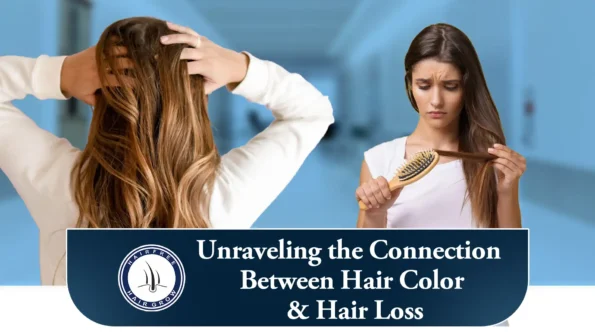Hair coloring is a popular way to change or enhance your look, but many people worry about whether it might lead to hair loss. If you’ve ever wondered the same thing, you’re not alone. Hair Color and Hair Loss are linked because chemicals in hair dyes can weaken hair and cause hair loss. Let’s dive into what really happens when you color your hair and whether it could be causing more harm than you think.
Understanding Hair Coloring
Before jumping to conclusions, it’s important to understand how hair coloring works. There are different types of hair coloring methods, such as:
- Permanent Hair Color: Long-lasting and changes the natural color of your hair.
- Semi-Permanent Hair Color: Adds color that fades with each wash, usually lasting 4-6 weeks.
- Demi-Permanent Hair Color: Sits between the above two, lasting longer than semi-permanent but not permanently altering the hair color.
The process of coloring your hair involves opening the hair cuticle and inserting color pigments deep into the hair strand. Chemicals like ammonia and peroxide are often used to lift the hair’s natural color and replace it with the new shade. While this gives you the desired color, these chemicals can take a toll on your hair’s health.
The Chemicals in Hair Coloring: Are They Damaging?
When you color your hair, you expose it to various chemicals. The most common ones include:
- Ammonia: Used to open the hair cuticle so that the color can penetrate.
- Peroxide: Used to strip away the natural hair color, allowing the new color to be deposited.
- Coloring Agents: The pigments that give your hair the new shade.
These chemicals can weaken the hair structure and cause some level of damage. However, does this damage lead directly to hair loss? Let’s explore further.
Does Hair Coloring Cause Hair Loss?
Hair loss can happen for several reasons, including hormonal imbalances, nutritional deficiencies, and medical conditions like alopecia. However, hair coloring doesn’t directly cause these types of hair loss.
What people often confuse with hair loss after coloring is actually hair breakage. When your hair undergoes chemical processes, it becomes weaker. If you notice more hair falling out when you brush or wash it after coloring, it’s likely due to breakage rather than true hair loss. The hair strand is breaking because its structure has been compromised by the chemicals.
Hair Breakage vs. Hair Loss: What’s the Difference?
It’s important to distinguish between hair breakage and hair loss:
- Hair Breakage occurs when the hair shaft weakens and snaps, often due to chemical treatments.
- Hair Loss happens when the entire hair follicle sheds, often caused by factors like genetics, stress, or illness.
In most cases related to hair coloring, what people experience is breakage, not hair loss.
Tips for Minimizing Hair Damage from Coloring
If you love coloring your hair but want to keep it healthy, there are a few things you can do:
Use Quality Products:
Choose hair colors that are less damaging. Ammonia-free products are gentler on the hair, but they may not last as long. It’s a trade-off between color durability and hair health.
Get Professional Help:
While at-home kits might seem convenient, getting your hair colored by a professional is usually safer. Experienced hairstylists know how to minimize damage and use techniques that keep your hair healthier.
Practice Proper Aftercare:
Avoid excessive heat styling and harsh treatments after coloring. Your hair is already delicate, so it’s best to be gentle with it. Moisturizing is crucial—use conditioners and hair masks that help restore hydration and lock in moisture.
Space Out Coloring Sessions:
Give your hair time to recover between coloring sessions. Overdoing it can lead to more breakage and damage.
Conclusion
To sum it up, hair coloring doesn’t directly cause the traditional types of hair loss that many fear. However, the process can lead to hair breakage, especially if it’s not done carefully. The key is to choose the right products, seek professional advice, and take good care of your hair afterward. By following these tips, you can enjoy the benefits of beautiful hair color without compromising its health.
If you’re struggling with hair loss and searching for effective solutions, consider visiting HairFree and HairGrow Clinic. Book a consultation today and take the first step towards regaining your hair and confidence with our expert hair transplant services.
Written By
MD (Skin & VD)
Dr. Kiran Chotaliya is a hair restoration expert specializing in Hair Color and Hair Loss. With in-depth knowledge, he offers personalized solutions to manage hair damage, prevent hair loss, and maintain scalp health, ensuring patients achieve strong, vibrant hair.
Disclaimer
We’ve made all possible efforts to ensure that the information provided here is accurate, up-to-date and complete, however, it should not be treated as a substitute for professional medical advice, diagnosis or treatment. See Detailed Disclaimers Here.


